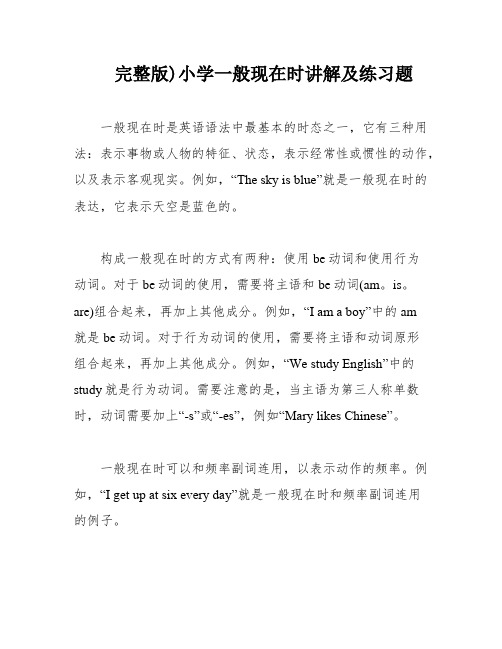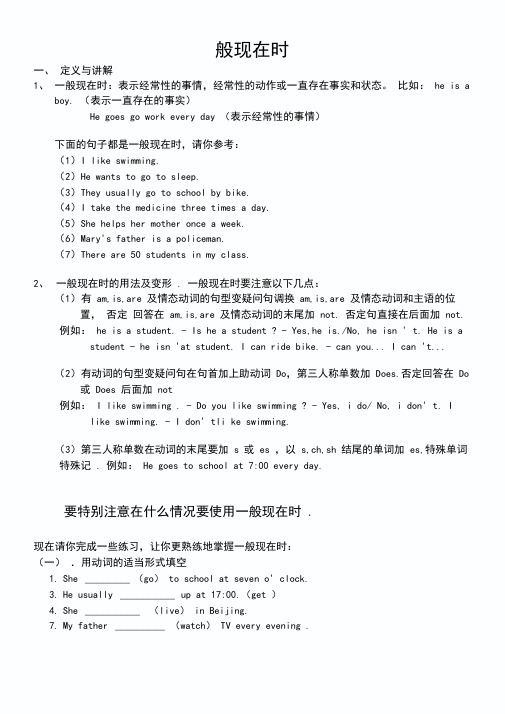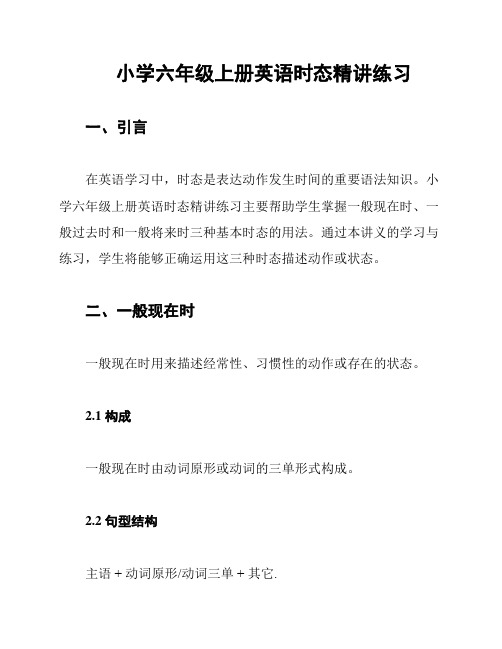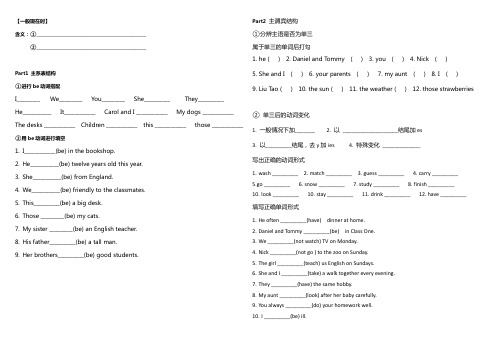(完整版)六年级英语一般现在时讲解加练习
完整版)小学一般现在时讲解及练习题

完整版)小学一般现在时讲解及练习题一般现在时是英语语法中最基本的时态之一,它有三种用法:表示事物或人物的特征、状态,表示经常性或惯性的动作,以及表示客观现实。
例如,“The sky is blue”就是一般现在时的表达,它表示天空是蓝色的。
构成一般现在时的方式有两种:使用be动词和使用行为动词。
对于be动词的使用,需要将主语和be动词(am。
is。
are)组合起来,再加上其他成分。
例如,“I am a boy”中的am就是be动词。
对于行为动词的使用,需要将主语和动词原形组合起来,再加上其他成分。
例如,“We study English”中的study就是行为动词。
需要注意的是,当主语为第三人称单数时,动词需要加上“-s”或“-es”,例如“Mary likes Chinese”。
一般现在时可以和频率副词连用,以表示动作的频率。
例如,“I get up at six every day”就是一般现在时和频率副词连用的例子。
一般现在时还可以用于构成否定句、一般疑问句和特殊疑问句。
对于be动词的否定句,需要在be动词后面加上not。
例如,“He is not a worker”就是be动词的否定句。
对于行为动词的否定句,需要在主语和动词原形之间加上don't或doesn't。
例如,“I don't like bread”和“He doesn't often play”就是行为动词的否定句。
对于一般疑问句,需要将be动词或do/does放在主语前面。
例如,“Are you a student?”就是一般疑问句。
对于特殊疑问句,需要在疑问词后面加上一般疑问句。
例如,“Where is my bike?”就是特殊疑问句。
需要注意的是,当主语为第三人称单数时,否定句和一般疑问句需要用doesn't,而不是don't或do。
例如,“He doesn't often play”和“Does she go to work by bike?”就是主语为第三人称单数时的否定句和一般疑问句。
(完整版)一般现在时和特殊疑问句讲解及练习

般现在时一、定义与讲解1、一般现在时:表示经常性的事情,经常性的动作或一直存在事实和状态。
比如:he is aboy. (表示一直存在的事实)He goes go work every day (表示经常性的事情)下面的句子都是一般现在时,请你参考:(1)I like swimming.(2)He wants to go to sleep.(3)They usually go to school by bike.(4)I take the medicine three times a day.(5)She helps her mother once a week.(6)Mary's father is a policeman.(7)There are 50 students in my class.2、一般现在时的用法及变形. 一般现在时要注意以下几点:(1)有am,is,are 及情态动词的句型变疑问句调换am,is,are 及情态动词和主语的位置,否定回答在am,is,are 及情态动词的末尾加not. 否定句直接在后面加not.例如:he is a student. - Is he a student ? - Yes,he is./No, he isn ' t. He is a student - he isn 'at student. I can ride bike. - can you... I can 't...(2)有动词的句型变疑问句在句首加上助动词Do,第三人称单数加Does.否定回答在Do 或Does 后面加not例如:I like swimming . - Do you like swimming ? - Yes, i do/ No, i don' t. I like swimming. - I don' tli ke swimming.(3)第三人称单数在动词的末尾要加s 或es ,以s,ch,sh 结尾的单词加es,特殊单词特殊记. 例如:He goes to school at 7:00 every day.要特别注意在什么情况要使用一般现在时 .现在请你完成一些练习,让你更熟练地掌握一般现在时:(一).用动词的适当形式填空1.She _________ (go) to school at seven o' clock.3.He usually ___________ up at 17:00.(get )4.She ___________ (live) in Beijing.7.My father __________ (watch) TV every evening .9. _______ Amy __________ (read) English every day10. Chen Jie sometimes __________ (go)to the park with her sister.二).选择填空1.I want _ h omework now.A. doingB. to doC. to do myD. do my2.It's time __ .A. go to schoolB. play gamesC. to go homeD. to do my homeworks 3.go and helpher.A. Let's meB. Let's usC. Let'sD. Let's to4.Do they have a new car? Yes, ____ .A .they are B.they have C. they don't D. they do5.He often _______ supper at 6:00 in the evening.A. haveB. has c. is having D. is eating6.We ______________ any Chinese classes on Friday.A. are havingB. aren 'th avingC. don'th aveD. are have三)、用括号内动词的适当形式填空。
(完整版)一般现在时态讲解及练习(精简版,错题版)

一般现在时态一、一般现在时的用法1)表示经常性、习惯性的动作或存在的状态。
通常与副词sometimes, often, usually, always, every day (year, month ), once (twice, three times) a day,等等频率副词(时间状语)连用。
e。
g。
They usually go to school by bike。
I take the medicine three times a day. 实义动词表示“动作”She helps her mother once a week.Mary’s father is a policeman.There are 50 students in my class. Be动词表示“状态”He is very busy now。
be 、do不能放一起,如果非要放一起,do后要加ing, 变成现在进行时。
2) 表示主语的特征、性格、爱好等。
e.g。
I work hard.I like watching TV.3) 表示客观真理e。
g. There are seven days in a week.The moon moves round the earth。
The sun rises in the east and sets in the west every day。
Tomorrow is Tuesday。
二、一般现在时的句子转换:三、一般现在时的结构:“主语+谓语+其它”,有时为了起强调作用,时间状语也可提前.三单变化:1)多数在动词后+s :play - plays like —likes ask———asks work———works get---gets stay-——stays2)以字母s, x, ch, sh或o结尾的动词,+-es:watch-——watches wish———wishes fix———fixes do——-d oes go---goes pass-—-passes3)以“辅音字母加 - y”结尾的动词,要先变y为i+-es。
小学六年级上册英语时态精讲练习

小学六年级上册英语时态精讲练习一、引言在英语学习中,时态是表达动作发生时间的重要语法知识。
小学六年级上册英语时态精讲练习主要帮助学生掌握一般现在时、一般过去时和一般将来时三种基本时态的用法。
通过本讲义的学习与练习,学生将能够正确运用这三种时态描述动作或状态。
二、一般现在时一般现在时用来描述经常性、习惯性的动作或存在的状态。
2.1 构成一般现在时由动词原形或动词的三单形式构成。
2.2 句型结构主语 + 动词原形/动词三单 + 其它.2.3 练习1. I (eat)_____ breakfast every morning.2. She (go)_____ to school by bus.3. The cat (sleep)_____ on the sofa.三、一般过去时一般过去时用来描述过去发生的动作或存在的状态。
3.1 构成一般过去时由动词的过去式构成。
3.2 句型结构主语 + 动词过去式 + 其它.3.3 练习1. I (watch)_____ a movie yesterday.2. She (visit)_____ her grandparents last week.3. They (play)_____ soccer in the park.四、一般将来时一般将来时用来描述将来要发生的动作或存在的状态。
4.1 构成一般将来时有两种构成方式:will + 动词原形和 be going to + 动词原形。
4.2 句型结构1. 主语 + will + 动词原形 + 其它.2. 主语 + be going to + 动词原形 + 其它.4.3 练习1. I (buy)_____ a new bike next month.2. She (travel)_____ to Japan with her family.3. They (move)_____ to a new house in two years.五、总结通过本讲义的学习与练习,学生应掌握一般现在时、一般过去时和一般将来时三种基本时态的构成、句型结构和用法。
(完整版)小学英语一般现在时三单动词的变化规则及练习题

一般现在时三单动词的变化规则及练习题1.一般情况下,直接加-s 2.以s. x. sh. ch. o结尾,加-es 3.以“辅音字母+y”结尾,变y为i,再加-es一、写出下列动词的第三人称单数drink ________ go _______ stay ________ make ________ look _________ have_______ pass_______ carry ____ come________ watch______sing_______ fly ________ study_______ brush________ do_________ teach_______二、用括号内动词的适当形式填空。
1. He often ________(have) dinner at home.2. Daniel and Tommy_______(be) in Class One. 3. We _______(not watch) TV on Monday. 4. Nick _______(not go) to the zoo on Sunday.5. What _______they often _______(do) on Sundays?6. _______ your mother _______(read) newspapers every day?7. Mike _______(like) cooking. 8. I _______(be) ill. I’m in bed. 9. Liu Tao _______(do) not like PE. 10. The child often_______(watch) TV in the evening.三、按照要求改写句子1. He watches TV every evening.(改为否定句)___________________________________________________2. I do my homework every day.(改为一般疑问句,作否定回答) ________________________________________________3. She likes books.(改为一般疑问句,做肯定回答)_______________________________________________________4. Amy likes playing computer games.(改为一般疑问句,作否定回答)________________________________________________________5. We go to school on Sundays.(改为否定句)_______________________________________________________四、改错(划出错误的地方,将正确的写在横线上)1. Is your brother like English? __________________2. Does he likes swimming? __________________3. He likes play games. __________________4. Shedon’tdo her homework on Sundays. _________________五、把句子补充完整。
小升初语法辨析一般现在时一般过去时一般将来时(讲义)人教PEP版英语六年级下册

小升初英语语法辨析:一般现在时、一般过去时、一般将来时&专项模拟练习一、一般现在时1.定义:表示经常发生的动作、存在的状态或普遍真理。
2.时间标志词:often(经常)、usually(通常)、always(总是)、sometimes(有时)、every day/week/month/year(每天/ 周/ 月/ 年)等。
3.结构:1.主语(非第三人称单数)+ 动词原形。
例如:You play basketball afterschool.(你放学后打篮球。
)2.主语(第三人称单数)+ 动词的第三人称单数形式。
例如:He playsbasketball after school.(他放学后打篮球。
)4.用法:1.表示经常性或习惯性的动作。
如:I go to school by bike every day.(我每天骑自行车去上学。
)2.表示现在的状态或特征。
如:She is tall and thin.(她又高又瘦。
)3.表示客观事实或普遍真理。
如:The earth moves around the sun.(地球绕着太阳转。
)二、一般过去时1.定义:表示过去某个时间发生的动作或存在的状态。
2.时间标志词:yesterday(昨天)、last week/month/year(上周/ 上个月/ 去年)、ago(……以前)、in + 过去的年份等。
3.结构:主语+ 动词的过去式。
例如:You played basketball yesterday.(你昨天打了篮球。
)4.用法:1.表示过去某个时间发生的动作。
如:I went to the park last Sunday.(我上周日去了公园。
)2.表示过去存在的状态。
如:He was happy yesterday.(他昨天很开心。
)三、一般将来时1.定义:表示将来某个时间要发生的动作或存在的状态。
2.时间标志词:tomorrow(明天)、next week/month/year(下周/ 下个月/ 明年)、in the future(在未来)等。
一般现在时知识讲解与专项练习(讲义)-人教PEP版英语六年级上册

六年级上册一般现在时知识讲解与专项练习一、一般现在时知识点【No. 1】概念:1.表不事物或人物的特征、状态。
如:The sky is blue.天空是蓝色的。
2.表示经常性或习惯性的动作。
如:I get up at six every day.我每天六点起床。
3.表示客观现实。
如:The earth goes around the sun.地球绕着太阳转。
【No.2】时间标志性词:every ... (every day/week/Sunday...)on+星期几(on Mondays/Tuesdays..)频度副词(always, usually often sometimes, rarely, seldom, never)【No.3】结构:①动词原形I like apples.②动词单三形式He plays football.③be动词I am a boy.有be无动(动:实义动词)①肯定句:主语+be+其他He is an English teacher.②否定句:主语+be not+其他He is not an English teacher.③一般疑问句:Be +主语+其他+...?Is he an English teacher?有动无be(动:实义动词)①肯定句:主语(非三单)+动词原形+其他I play football.主语(三单)+动词三单形式+其他He plays football.②否定句:主语(非三单)+don’t+动词原形+其他I don't play football.主语(三单)+doesn’t动词原形+其他He doesn't play football.③一般疑问句:Do+主语(非三单)+动词原形+其他?Do you play football?Does+主语(三单)+动词原形+其他?①肯定形式:主语十情态动词can/may+动词原形+宾语。
人教版(PEP)英语六年级下册语法练习 一般现在时概念及练习汇总

【一般现在时】含义:①_________________________________________________②_________________________________________________Part1 主系表结构①进行be动词搭配I_________ We_________ You_________ She__________ They__________He___________ It____________ Carol and I ____________ My dogs ____________ The desks ____________ Children ____________ this ____________ those ____________②用be动词进行填空1.I____________(be) in the bookshop.2.He___________(be) twelve years old this year.3.She___________(be) from England.4.We___________(be) friendly to the classmates.5.This__________(be) a big desk.6.Those _________(be) my cats.7.My sister _________(be) an English teacher.8.His father__________(be) a tall man.9.Her brothers__________(be) good students. Part2主谓宾结构①分辨主语是否为单三属于单三的单词后打勾1.he ( )2. Daniel and Tommy ( )3. you ( )4. Nick ( )5.She and I ( )6. your parents ( )7. my aunt ( )8. I ( )9.Liu Tao ( ) 10. the sun ( ) 11. the weather ( ) 12. those strawberries② 单三后的动词变化1. 一般情况下加_______2. 以___________________结尾加es3. 以_________结尾,去y加ies4. 特殊变化_____________写出正确的动词形式1.wash _________2. match _________3. guess _________4. carry _________5.go _________6. snow _________7. study _________8. finish _________10.look _________ 10. stay _________ 11. drink _________ 12. have _________填写正确单词形式1.He often _________(have) dinner at home.2.Daniel and Tommy _________(be) in Class One.3.We _________(not watch) TV on Monday.4.Nick _________(not go ) to the zoo on Sunday.5.The girl _________(teach) us English on Sundays.6.She and I _________(take) a walk together every evening.7.They _________(have) the same hobby.8.My aunt _________(look) after her baby carefully.9.You always _________(do) your homework well.10.I _________(be) ill.按要求进行句型改写1.Daniel watches TV every evening. (改为否定句)_____________________________________________________________________________ 2.I do my homework everyday. (改为一般疑问句,并做否定回答)_____________________________________________________________________________ 3.She likes going skating. (改为一般疑问句,并作肯定回答)_____________________________________________________________________________ 4.He speaks English very well.(改为否定句)_____________________________________________________________________________ 5.Jerry and Lisa’s home is near the park. (改为否定句)_____________________________________________________________________________正确单词及句式进行填空1._______ the desk _______ (have) four legs? Yes, it does.2._______ she _______ (do) her homework everyday? Yes, she does.3._______ he _______ (live) in Huanggang? No, he doesn’t.4.Does Danny _______ (see) the apple tree? Yes,she does.5._______ she _______ (come) from America? No, she doesn’t.6.What _______ they often _______ (do) on Sundays?7._______ your parents _______ (read)newspapers everyday?8.We ______________ (not watch) TV on Monday.9.Nick ______________ (not go) to the zoo on Sunday.10.The black birds ______________ (not be) in the tree. 对划线部分进行提问1.John comes from Canada._____________________________________________________________________________ 2.I take photos in the park._____________________________________________________________________________ 3.Jackie runs every evening._____________________________________________________________________________ 4.I always dance in the park._____________________________________________________________________________ 5.Simon and Daniel go skating every winter._____________________________________________________________________________改正错误(画出错误的地方,将正确的改写在横线上)1.Is your brother speak English?____________________________________________________2.Does he likes going fishing?____________________________________________________3.He likes play games after class.___________________________________________________4.Mr.Wu teachs us English.____________________________________________________5.She don’t do her homework on Sundays.___________________________________________6.The twins usually have rice for lunch. ____________________________________________7.They usually goes to bed at 9 o’clock._____________________________________________8.Where is he come from?____________________________________________________9.My father often listen to the radio in the evening.____________________________________10.What do you in the evening do?________________________________________________11.What’s the weather likes in spring?_______________________________________________。
- 1、下载文档前请自行甄别文档内容的完整性,平台不提供额外的编辑、内容补充、找答案等附加服务。
- 2、"仅部分预览"的文档,不可在线预览部分如存在完整性等问题,可反馈申请退款(可完整预览的文档不适用该条件!)。
- 3、如文档侵犯您的权益,请联系客服反馈,我们会尽快为您处理(人工客服工作时间:9:00-18:30)。
一般现在时一般现在时的定义:表示经常性的事情,经常性的动作或一般性事实。
一般现在时的标志词:often 经常,usually通常,always 总是,every每个,sometimes 有时一般现在时的结构:只有在主语是第三人称单数时动词发生“三单变化”,其他用动词的原形。
三单变化:1.多数在动词后+s play — plays like — likes(1)直接在动词词尾加-s.ask---asks work---works get---gets stay---stays(2)以字母s, x, ch, sh或o结尾的动词,在词尾直接加-es.watch---watches wish---wishes fix---fixes do---doesgo---goes pass---passes(3)以“辅音字母加- y”结尾的动词,要先变y为i再加-es.try---tries study---studies cry---cries fly---flies2.不规则变化:be---- is are have----has二、一般现在时用法1. 表示经常性,习惯性,永久性的动作或存在的状态.通常与副词sometimes, often, usually, always, every day (year, month ), once (twice, three times) a day,等时间状语连用。
They usually go to school by bike.I take the medicine three times a day.She helps her mother once a week.Mary’s father is a policeman.There are 50 students in my class.2. 表示客观真理,科学原理,自然现象,等客观事实或格言,谚语等。
The sun rises in the east and sets in the west every day.The man who has never been to the Great Wall is not a real man.Tomorrow is Tuesday.三、一般现在时的句子转换:(1)当句子中有be动词或情态动词时,则把be动词或情态动词(can,could 等等)提到主语的前面变成疑问句;在be动词或情态动词后面加not变成否定句.例:①陈述句:She is a student.疑问句→ Is she a student?否定句→ She is not a student.①陈述句:I can swim.疑问句→ Can you swim否定句→ I can not swim.(2)当句子中即没有be动词,也没有情态动词时,则在主语前加助动词do (you,以及复数), does(单数she,he,it)变成问句;在主语后谓语动词前加助动词don’t(I,you,以及复数), doesn’t(单数she,he,it)变成否定句,助动词后的动词要变成动词原形。
例:①陈述句:We get up at 7:00 every morning.疑问句→Do you get up at 7:00 every morning?否定句→We don’t get up at 7:00 every morning.①陈述句:She has a little brother.疑问句→ Does she have a little brother?否定句→ She doesn’t have a little brother.(一).用动词的适当形式填空1. She _________(go) to school at seven o’clock.2. He usually ___________ up at 17:00.(get )3. She ___________ (live) in Beijing.4. My father __________ (watch) TV every evening.5.________ Amy _________ (read) English every day?6. Chen Jie sometimes _________(go)to the park with her sister.(二).选择填空7.I want____homework now. A. doing B. to do C. to do my D. do my 8.It's time______.A. go to schoolB. play gamesC. to go homeD. to do my homework 9.______go and help her. A. Let's me B. Let's us C. Let's D. Let's to 10.Do they have a new car? Yes,_____.A .they are B.they have C. they don't D. they do11.He often _________ supper at 6:00 in the evening.A. haveB. has c. is having D. is eating12. We _____________ any Chinese classes on Friday.A. are havingB. aren’t havingC. don’t haveD. are have(三)、用括号内动词的适当形式填空。
13. He often _________ (have) dinner at home.14. Daniel and Tommy _________ (be) in Class One.15. We _________ (not watch) TV on Monday.16. Nick_________ (not go) to the zoo on Sunday.17. _________they _________ (like) the World Cup?18. What _________ they often_________ (do) on Saturdays?19. _________your parents _________ (read) newspapers every day?20. The girl _________ (teach) us English on Sundays.21. She and I _________ (take) a walk together every evening.22. There _________ (be) some water in the bottle.23. Mike_________ (like) cooking.24. They _________ (have) the same hobby.25. My aunt _________ (look) after her baby carefully.26. You always _________ (do) your homework well.27. I _________ (be) ill. I’m staying in bed.28. She _________ (go) to school from Monday to Friday.29. Liu Tao _________ (do) not like PE.30. The child often _________ (watch) TV in the evening.31. Wang Kai and Wang li_________ (have) eight lessons this term.32. -What day _________ (be) it today?-It’s Saturday.33.We often___________(play) in the playgound.34.He _________(get) up at six o’clock.35. __________you _________(brush) your teeth every morning.36. What __________(do) he usually _________ (do) after school?37. Danny__________(study) English,Chinese,Maths,Science and Art an school.38. Mike sometimes __________(go) to the park with his sister39. At eight at night, she __________(watch) TV with his parents.40. ________ Mike________(read) English every day?41. How many lessons_________your classmate________(have) on Monday?42.What time_________his mother_________(do) the housework?43. Do you often play football after school? (肯定回答)______________________________________________________44. I have many books.(改为否定句)______________________________________________________45. Gao Shan’s sister likes playing table tennis (改为否定句)______________________________________________________46. She lives in a small town near New York.(改为一般疑问句)______________________________________________________47. I watch TV every day. (改为一般疑问句)______________________________________________________48. David has got a goal. (改为一般疑问句)______________________________________________________49. We have four lessons.(否定句)______________________________________________________50. Nancy doesn’t run fast (肯定句)______________________________________________________51.My dog runs fast.一般疑问句:__________________________________________否定句:__________________________________________52.Mike has two letters for him.一般疑问句:__________________________________________否定句:__________________________________________53.I usually play football on Friday afternoon.否定句:__________________________________________一般疑问句:__________________________________________划线提问:__________________________________________ 54.Su Yang usually washes some clothes on Saturday.否定句:__________________________________________一般疑问句:__________________________________________划线提问:__________________________________________ 55.Mingming usually waters the flowers every day否定句:__________________________________________一般疑问句:__________________________________________划线提问__________________________________________ 56.Tom does his homework at home.否定句:__________________________________________一般疑问句:__________________________________________划线提问__________________________________________。
